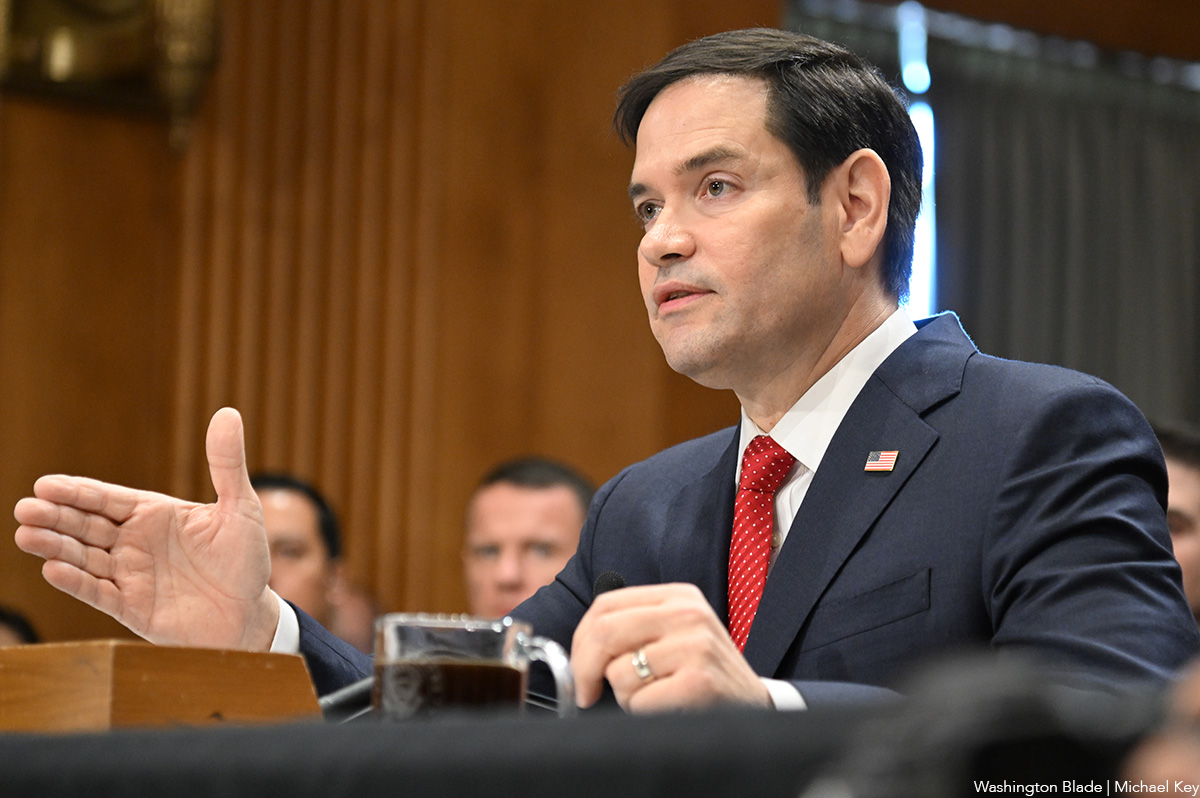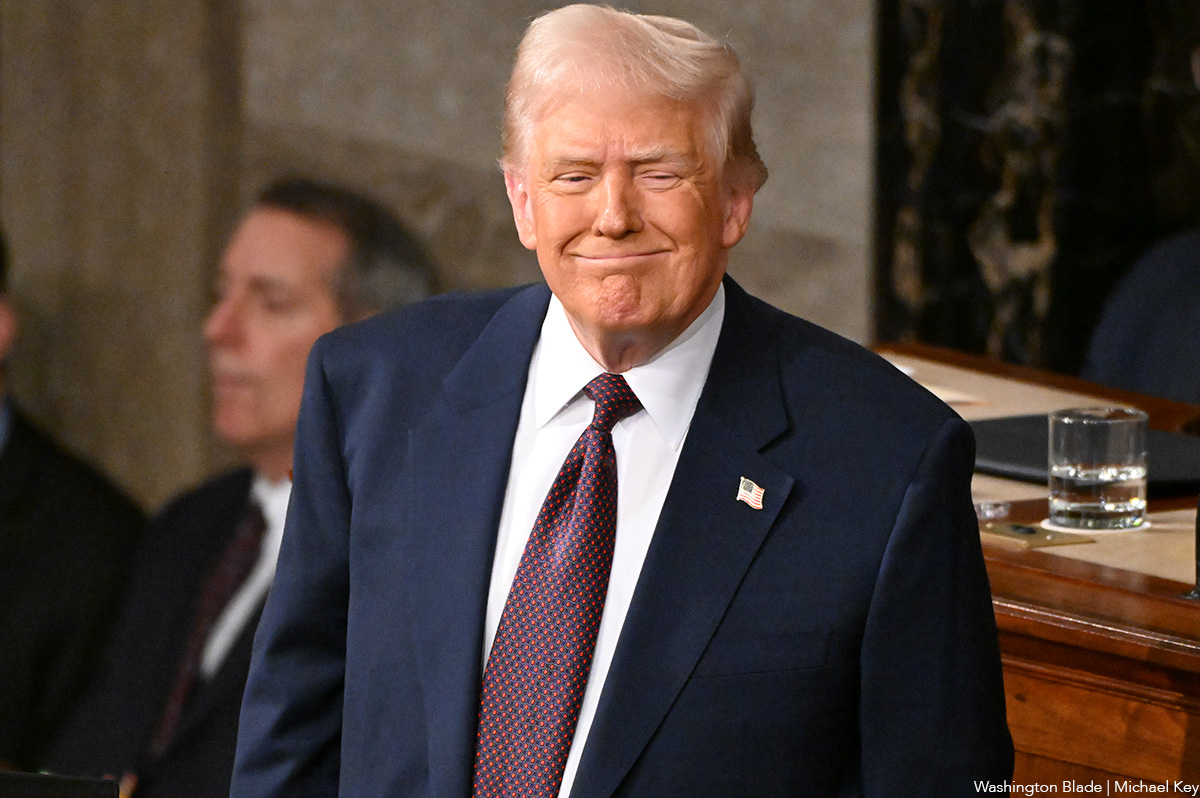National
Hawaii governor vetoes civil unions bill
Activists denounce move as a ‘disgrace,’ plan lawsuit

Hawaii Gov. Linda Lingle on Tuesday vetoed a bill that would have enacted civil unions in the state. (Photo courtesy of Lingle’s office)
The governor of Hawaii on Tuesday vetoed a bill that would have instituted civil unions in the Aloha State as LGBT groups announced plans to continue the fight for relationship recognition.
At a press conference announcing her decision, Gov. Linda Lingle (R) equated civil unions to same-sex marriage and said the issue inspired such strong emotions that it should be left for the people to decide.
“It was the depth of emotion felt by those on both sides of the issue that revealed to me how fundamental the institution of marriage is [to] our community,” she said.
Lingle had until Tuesday to sign the civil unions bill, veto it or take no action to allow the bill to become law.
During the press conference, the governor said Hawaii’s residents should decide the issue of civil unions through the referendum process.
“This is a decision that should not be made by one person sitting in her office, or by members of the majority party behind closed doors in a legislative caucus, but by all the people of Hawaii behind the curtain of the voting booth,” she said.
In 1998, Hawaii voters approved an amendment to their state constitution allowing the legislature to prohibit same-sex marriage in Hawaii. The Hawaii Legislature subsequently passed a statute banning same-sex marriage, but left the door open for civil unions.
In a statement, Alan Spector, legislative affairs co-chair for Equality Hawaii, said Lingle’s veto marked a “sad day for the thousands of Hawaii families who remain second-class citizens.”
“We fail to see how the governor’s actions are in the best interest of Hawaii’s future and are nothing more than political maneuvering at the expense of people’s lives,” Spector said. “We’re disappointed and outraged that same-sex families will not be treated equally under Hawaii law, but vow to come back and fight this fight another day.”
Rea Carey, executive director of the National Gay & Lesbian Task Force, also expressed disappointment in a statement that followed Lingle’s decision to veto the civil unions bill.
“Gov. Lingle’s veto of legislation that would protect and strengthen Hawaii’s families is beyond a disappointment — it is a disgrace,” Carey said. “Hawaii’s lawmakers passed this bill because it was about fundamental fairness.”
Carey said the governor’s action “flies in the face of both common sense and common humanity” and urged the legislature to override her veto.
But House Speaker Calvin Say reportedly said last week the State House would not hold a special session to override Lingle’s vetoes.
R. Clarke Cooper, executive director for the Log Cabin Republicans, said his organization’s affiliates in Hawaii worked hard to influence the Republican governor to at least allow the bill to become law without her signature.
“Since this spring, Log Cabin Republicans on the Hawaiian Islands as well as the mainland United States have made it clear to Gov. Lingle and other Hawaiian lawmakers that we supported the civil union legislation,” he said.
Cooper said individual members of Log Cabin lobbied lawmakers and Lingle to support the civil unions legislation.
Activists in Hawaii are pursuing several options that could institute civil unions in Hawaii despite Lingle’s veto.
In a statement, Lambda Legal and the American Civil Liberties Union of Hawaii announced they were filing a lawsuit in state court to fight for civil unions in the state.
Laurie Temple, staff attorney for the ACLU, said she’s “disappointed” Lingle didn’t follow through with signing the civil unions bill or allowing the legislation to become law.
“Luckily for the people of Hawaii, however, our constitution prevents discrimination based on sexual orientation,” she said. “If the governor won’t honor her oath to uphold the constitution, the courts will.”
Jennifer Pizer, national marriage project director for Lambda Legal, told the Blade her organization had litigation prepared in the spring when the civil unions legislation appeared to have stalled in the Hawaii Legislature.
“We were hoping that it would not be necessary,” she said. “Now that it is, we will be switching into litigation mode.”
Pizer said Lambda would file the lawsuit, although she didn’t know the exact timing of the case. She noted that Lambda has plaintiff couples lined up for the lawsuit, but declined to offer more information about them.
“I can’t give you the details of who the clients are or exactly what the lawsuit looks like,” she said. “That will be public when we file it, but we have been working on it for quite some time.”
Pizer said that guessing how long the litigation process would take is “very difficult to say” and would depend on how the state decides to defend the case.
“We’re curious to know exactly what the path will be and how long it will take, but it’s impossible to tell until we see how the state decides to answer,” she said.
Other groups — including Equality Hawaii and the Human Rights Campaign — are making plans to elect new lawmakers and a governor who would support enacting civil unions in the state.
Don Bentz, treasurer for Equality Hawaii, said his group is awaiting the election in the fall to determine the best path for civil unions legislation.
“We have a gubernatorial race and a number of allies in the House and the Senate are both up for re-election,” Bentz said. “So depending upon who gets re-elected or does not get re-elected, that would kind of determine whether we want to reintroduce [the bill] or wait for a lawsuit to work its way through the courts.”
One candidate for governor is already capitalizing on Lingle’s veto in the race to succeed her as governor.
In a statement, Democratic candidate Neil Abercrombie said Lingle mistakenly characterized the civil unions legislation as a bill that would enact same-sex marriage.
“The state legislature has already defined marriage as between a man and a woman,” Abercrombie said. “Civil unions respect our diversity, protect people’s privacy and reinforce our core values of equality and aloha.”
Abercrombie said ensuring Hawaii residents receive equal treatment will be up to the next governor and legislature.
“Protecting people’s civil rights cannot be compromised,” Abercrombie said. “I am committed to that most essential of constitutional imperatives.”
Lingle predicted the issue of civil unions would come to the ballot soon.
“I would be surprised if this does not go on the next available ballot,” she said. “I would encourage lawmakers to do it — whether it’s those who are in office or those who are not.”
Bentz said the idea of bringing the issue of civil unions to the ballot has been under discussion for some time, but isn’t something LGBT rights advocates want to see happen.
“When you go to the ballot, the opposition throws out all these lies and misinformation that basically cause people to vote against it,” he said.
Bentz said a voter-initiated ballot initiative isn’t available in Hawaii and that the matter could only come to the ballot following a constitutional convention or direction from the legislature.
State Department
Rubio mum on Hungary’s Pride ban
Lawmakers on April 30 urged secretary of state to condemn anti-LGBTQ bill, constitutional amendment

More than 20 members of Congress have urged Secretary of State Marco Rubio to publicly condemn a Hungarian law that bans Pride events.
California Congressman Mark Takano, a Democrat who co-chairs the Congressional Equality Caucus, and U.S. Rep. Bill Keating (D-Mass.), who is the ranking member on the House Foreign Affairs Committee’s Europe Subcommittee, spearheaded the letter that lawmakers sent to Rubio on April 30.
Hungarian lawmakers in March passed a bill that bans Pride events and allow authorities to use facial recognition technology to identify those who participate in them. MPs last month amended the Hungarian constitution to ban public LGBTQ events.
“As a NATO ally which hosts U.S. service members, we expect the Hungarian government to abide by certain values which underpin the historic U.S.-Hungary bilateral relationship,” reads the letter. “Unfortunately, this new legislation and constitutional amendment disproportionately and arbitrarily target sexual and gender minorities.”
Prime Minister Viktor Orbán’s government over the last decade has moved to curtail LGBTQ and intersex rights in Hungary.
A law that bans legal recognition of transgender and intersex people took effect in 2020. Hungarian MPs that year also effectively banned same-sex couples from adopting children and defined marriage in the constitution as between a man and a woman.
An anti-LGBTQ propaganda law took effect in 2021. The European Commission sued Hungary, which is a member of the European Union, over it.
MPs in 2023 approved the “snitch on your gay neighbor” bill that would have allowed Hungarians to anonymously report same-sex couples who are raising children. The Budapest Metropolitan Government Office in 2023 fined Lira Konyv, the country’s second-largest bookstore chain, 12 million forints ($33,733.67), for selling copies of British author Alice Oseman’s “Heartstopper.”
Former U.S. Ambassador to Hungary David Pressman, who is gay, participated in the Budapest Pride march in 2024 and 2023. Pressman was also a vocal critic of Hungary’s anti-LGBTQ crackdown.
“Along with years of democratic backsliding in Hungary, it flies in the face of those values and the passage of this legislation deserves quick and decisive criticism and action in response by the Department of State,” reads the letter, referring to the Pride ban and constitutional amendment against public LGBTQ events. “Therefore, we strongly urge you to publicly condemn this legislation and constitutional change which targets the LGBTQ community and undermines the rights of Hungarians to freedom of expression and peaceful assembly.”
U.S. Reps. Pramila Jayapal (D-Wash.), Sarah McBride (D-Del.), Jim Costa (D-Calif.), James McGovern (D-Mass.), Gerry Connolly (D-Va.), Summer Lee (D-Pa.), Joaquin Castro (D-Texas), Julie Johnson (D-Texas), Ami Bera (D-Calif.), Mark Pocan (D-Wis.), Lloyd Doggett (D-Texas), Becca Balint (D-Vt.), Gabe Amo (D-R.I.), Ted Lieu (D-Calif.), Robert Garcia (D-Calif.), Dina Titus (D-Nev.), Raja Krishnamoorthi (D-Ill.), Jan Schakowsky (D-Ill.) and Mike Quigley (D-Ill.) and Del. Eleanor Holmes Norton (D-D.C.) signed the letter alongside Takano and Keating.
A State Department spokesperson on Wednesday declined to comment.
Federal Government
HRC memo details threats to LGBTQ community in Trump budget
‘It’s a direct attack on LGBTQ+ lives’

A memo issued Monday by the Human Rights Campaign details threats to LGBTQ people from the “skinny” budget proposal issued by President Donald Trump on May 2.
HRC estimates the total cost of “funding cuts, program eliminations, and policy changes” impacting the community will exceed approximately $2.6 billion.
Matthew Rose, the organization’s senior public policy advocate, said in a statement that “This budget is more than cuts on a page—it’s a direct attack on LGBTQ+ lives.”
“Trump is taking away life-saving healthcare, support for LGBTQ-owned businesses, protections against hate crimes, and even housing help for people living with HIV,” he said. “Stripping away more than $2 billion in support sends one clear message: we don’t matter. But we’ve fought back before, and we’ll do it again—we’re not going anywhere.”
Proposed rollbacks or changes at the U.S. Department of Health and Human Services will target the Ryan White HIV/AIDS Program, other programs related to STI prevention, viral hepatitis, and HIV, initiatives housed under the Substance Abuse and Mental Health Services Administration, and research by the National Institutes of Health and Agency for Healthcare Research and Quality.
Other agencies whose work on behalf of LGBTQ populations would be jeopardized or eliminated under Trump’s budget include the U.S. Department of Housing and Urban Development, the U.S. Department of Justice, the U.S. Small Business Administration, and the U.S. Department of Education.
U.S. Supreme Court
Supreme Court allows Trump admin to enforce trans military ban
Litigation challenging the policy continues in the 9th Circuit

The U.S. Supreme Court on Tuesday allowed the Trump-Vance administration to enforce a ban on transgender personnel serving in the U.S. Armed Forces pending the outcome of litigation challenging the policy.
The brief order staying a March 27 preliminary injunction issued by the U.S. District Court for the Western District of Washington notes the dissents from liberal Justices Sonia Sotomayor, Elena Kagan, and Ketanji Brown Jackson.
On the first day of his second term, President Donald Trump issued an executive order requiring Secretary of Defense Pete Hegseth to effectuate a ban against transgender individuals, going further than efforts under his first administration — which did not target those currently serving.
The DoD’s Feb. 26 ban argued that “the medical, surgical, and mental health constraints on individuals who have a current diagnosis or history of, or exhibit symptoms with, gender dysphoria are incompatible with the high mental and physical standards necessary for military service.”
The case challenging the Pentagon’s policy is currently on appeal before the U.S. Court of Appeals for the Ninth Circuit. The lead plaintiff is U.S. Navy Commander Emily Shilling, who is joined in the litigation by other current transgender members of the armed forces, one transgender person who would like to join, and a nonprofit whose members either are transgender troops or would like to be.
Lambda Legal and the Human Rights Campaign Foundation, both representing the plaintiffs, issued a statement Tuesday in response to the Supreme Court’s decision:
“Today’s Supreme Court ruling is a devastating blow to transgender servicemembers who have demonstrated their capabilities and commitment to our nation’s defense.
“By allowing this discriminatory ban to take effect while our challenge continues, the Court has temporarily sanctioned a policy that has nothing to do with military readiness and everything to do with prejudice.
“Transgender individuals meet the same standards and demonstrate the same values as all who serve. We remain steadfast in our belief that this ban violates constitutional guarantees of equal protection and will ultimately be struck down.”
U.S. Solicitor General D. John Sauer noted that courts must show “substantial deference” to DoD decision making on military issues.
“The Supreme Court’s decision to allow the military ban to go into effect is devastating for the thousands of qualified transgender servicemembers who have met the standards and are serving honorably, putting their lives on the line for their country every single day,” said GLAD Law Senior Director of Transgender and Queer Rights Jennifer Levi. “Today’s decision only adds to the chaos and destruction caused by this administration. It’s not the end of the case, but the havoc it will wreak is devastating and irreparable. History will confirm the weight of the injustice done today.”
“The Court has upended the lives of thousands of servicemembers without even the decency of explaining why,” said NCLR Legal Director Shannon Minter. “As a result of this decision, reached without benefit of full briefing or argument, brave troops who have dedicated their lives to the service of our country will be targeted and forced into harsh administrative separation process usually reserved for misconduct. They have proven themselves time and time again and met the same standards as every other soldier, deploying in critical positions around the globe. This is a deeply sad day for our country.”
Levi and Minter are the lead attorneys in the first two transgender military ban cases to be heard in federal court, Talbott v. Trump and Ireland v. Hegseth.
U.S. Rep. Mark Takano (D-Calif.) issued a statement on behalf of the Congressional Equality Caucus, where he serves as chair.
“By lifting the lower court’s preliminary injunction and allowing Trump to enforce his trans troop ban as litigation continues, the Supreme Court is causing real harm to brave Americans who simply want to serve their nation in uniform.
“The difference between Donald Trump, a draft dodger, and the countless brave Americans serving their country who just happen to be trans couldn’t be starker. Let me be clear: Trump’s ban isn’t going to make our country safer—it will needlessly create gaps in critical chains of military command and actively undermine our national security.
“The Supreme Court was absolutely wrong to allow this ban to take effect. I hope that lower courts move swiftly so this ban can ultimately be struck down.”
SPARTA Pride also issued a statement:
“The Roberts Court’s decision staying the preliminary injunction will allow the Trump purge of transgender service members from the military to proceed.
“Transgender Americans have served openly, honorably, and effectively in the U.S. Armed Forces for nearly a decade. Thousands of transgender troops are currently serving, and are fully qualified for the positions in which they serve.
“Every court up to now has found that this order is unconstitutional. Nevertheless, the Roberts Court – without hearing any evidence or argument – decided to allow it to go forward. So while the case continues to be argued, thousands of trans troops will be purged from the Armed Forces.
“They will lose their jobs. They will lose their commands, their promotions, their training, pay and benefits, and time. Their units will lose key players; the mission will be disrupted. This is the very definition of irreparable harm.”
Imara Jones, CEO of TransLash Media, issued the following statement:
“The Supreme Court’s decision to uphold Trump’s ban on transgender soldiers in the military, even as the judicial process works its way through the overall question of service, signals that open discrimination against trans people is fair game across American society.
“It will allow the Trump Administration to further advance its larger goal of pushing trans people from mainstream society by discharging transgender military members who are currently serving their country, even at a time when the military has struggled recently to meet its recruiting goals.
“But even more than this, all of my reporting tells me that this is a further slide down the mountain towards authoritarianism. The hard truth is that governments with authoritarian ambitions have to separate citizens between who is worthy of protection and who’s not. Trans people are clearly in the later category. And this separation justifies the authoritarian quest for more and more power. This appears to be what we are witnessing here and targeting trans people in the military is just a means to an end.”
-

 The Vatican3 days ago
The Vatican3 days agoAmerican cardinal chosen as next pope
-

 a&e features3 days ago
a&e features3 days agoYour guide to the many Pride celebrations in D.C. region
-

 U.S. Supreme Court4 days ago
U.S. Supreme Court4 days agoSupreme Court allows Trump admin to enforce trans military ban
-

 District of Columbia4 days ago
District of Columbia4 days agoWorldPride permits for National Mall have yet to be approved













